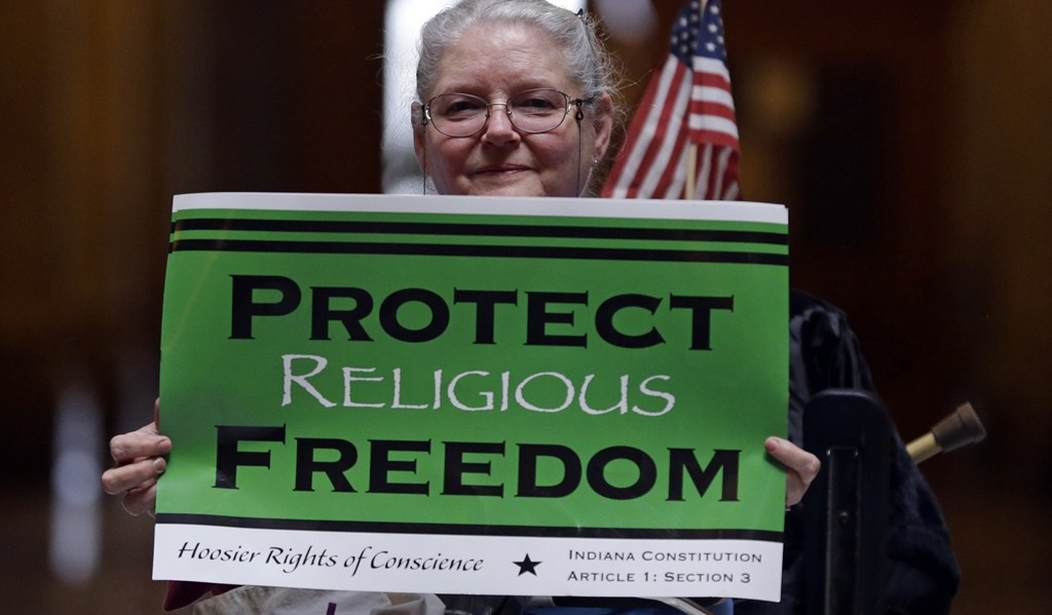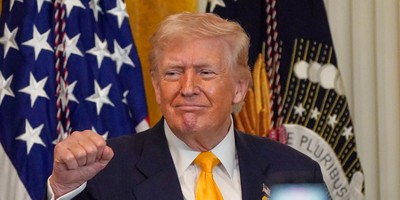Last Friday's landmark Supreme Court decision on same-sex marriage has set the stage for the new legal battle to be waged in the coming years: the battle for religious liberty. Now that same-sex marriage has been declared a constitutional right, those who conscientiously object to affirming same-sex relationships will soon find themselves in the same legal category as the Jim Crow racists who denied African-Americans fair treatment.
The core ideal that has been proffered in the gay rights movement — and which the Supreme Court cited in its ruling — is the ideal of equality. In the law, "equal treatment" is a principle that only applies to things that are fundamentally the same in nature. It means treating things that are the same, the same; but things that are different should, of course, be treated differently. In the debate over same-sex marriage, the left's position had been that same-sex marriage and male-female marriage are qualitatively the same thing. Consequently, they should both receive equal treatment under law. Opponents of same-sex marriage did not deny "equality" per se; they simply held that same-sex relationships were fundamentally different from male-female marriages, and therefore are not entitled to the same treatment.
But that debate is now over, at least legally speaking. The Supreme Court has declared same-sex marriages and traditional male-female marriages to be qualitatively the same, and therefore entitled to equal protection under law. Whether right or wrong, this puts all dissenters in the same legal position as the old Jim Crow racists: they are bigots whose ways cannot be tolerated.
The key question now before the courts is: Are religious objectors to same-sex marriage entitled to act publicly in ways that do not abide the Court's expanded definition of marriage? The likely answer to come from this Court, given its recent opinion, is "No."
Recommended
In issuing the Court's opinion, Justice Anthony Kennedy wrote briefly of religious liberty protections. Yet he seemed to define religious liberty in terms of speech, not of public action or "free exercise." He writes:
The First Amendment ensures that religious organizations and persons are given proper protection as they seek to teach the principles that are so fulfilling and so central to their lives and faiths, and to their own deep aspirations to continue the family structure they have long revered.
Yet he also says:
Many who deem same-sex marriage to be wrong reach that conclusion based on decent and honorable religious or philosophical premises, and neither they nor their beliefs are disparaged here. But when that sincere, personal opposition becomes enacted law and public policy, the necessary consequence is to put the imprimatur of the State itself on an exclusion that soon demeans or stigmatizes those whose own liberty is then denied. Under the Constitution, same-sex couples seek in marriage the same legal treatment as opposite-sex couples, and it would disparage their choices and diminish their personhood to deny them this right.
Chief Justice John Roberts took issue with Kennedy's omission of the right to "free exercise":
The majority graciously suggests that religious believers may continue to “advocate” and “teach” their views of marriage. The First Amendment guarantees, however, the freedom to “exercise” religion. Ominously, that is not a word the majority uses. Hard questions arise when people of faith exercise religion in ways that may be seen to conflict with the new right to same-sex marriage—when, for example, a religious college provides married student housing only to opposite-sex married couples, or a religious adoption agency declines to place children with same-sex married couples . . . There is little doubt that these and similar questions will soon be before this Court. Unfortunately, people of faith can take no comfort in the treatment they receive from the majority today.
Justice Clarence Thomas added:
Religious liberty is about more than just the protection for “religious organizations and persons . . . as they seek to teach the principles that are so fulfilling and so central to their lives and faiths.” Religious liberty is about freedom of action in matters of religion generally, and the scope of that liberty is directly correlated to the civil restraints placed upon religious practice.
The Court's conception of religious liberty, as reflected in Kennedy's opinion, is one that would neuter religion of all public consequence and press it into the private sphere. It would restrict the influence of religion to "pews, homes and hearts." Justice Alito expressed concern over this limiting of religious liberty, particularly as it regards opposition to same-sex marriage:
I assume that those who cling to old beliefs will be able to whisper their thoughts in the recesses of their homes, but if they repeat those views in public, they will risk being labeled as bigots and treated as such by governments, employers, and schools.
The fallout to come for religious liberty is, of course, not yet determined, and it is possible that Kennedy—often the Court's deciding swing vote—will show wiggle room for some religious objectors, depending on the case. But the key upshot from the Court's ruling is clear: when push truly comes to shove, the free exercise of religion must give way to the new sexual orthodoxy that is now enshrined in law.
Meanwhile, Evangelicals and other religious dissenters are preparing to pay the cost of theological faithfulness. Gov. Mike Huckabee anticipates that many pastors, university presidents, and Christian businessmen will be forced to choose between following God's will and obeying the state. The Ethics & Religious Liberty Commission is advising churches about the legal implications of this ruling and how to navigate future waters. We have seen the curtailment of religious liberty in other highly secularized western countries, like Canada. This SCOTUS ruling looks to sets the stage for a similar curtailment of religious liberty.
When Christians are forced to choose between God and Caesar, the answer is not a difficult one. But it's a shame that here in America, this once-idealized haven for religious minorities, the awful choice between God and Caesar will likely be thrust upon millions.

























Join the conversation as a VIP Member